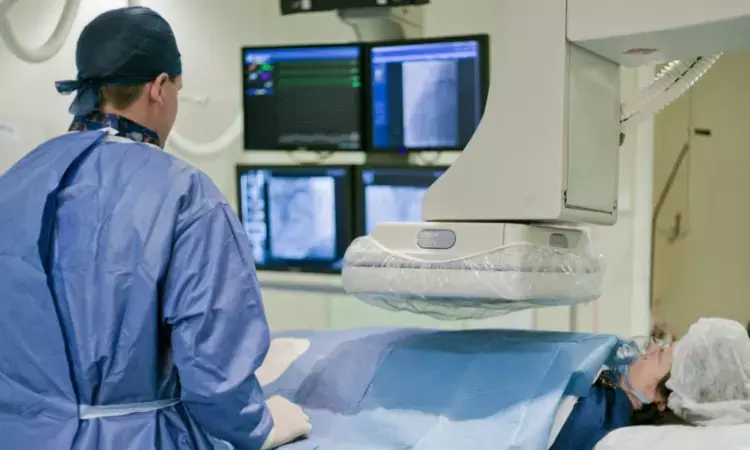- Home
- Medical news & Guidelines
- Anesthesiology
- Cardiology and CTVS
- Critical Care
- Dentistry
- Dermatology
- Diabetes and Endocrinology
- ENT
- Gastroenterology
- Medicine
- Nephrology
- Neurology
- Obstretics-Gynaecology
- Oncology
- Ophthalmology
- Orthopaedics
- Pediatrics-Neonatology
- Psychiatry
- Pulmonology
- Radiology
- Surgery
- Urology
- Laboratory Medicine
- Diet
- Nursing
- Paramedical
- Physiotherapy
- Health news
- Fact Check
- Bone Health Fact Check
- Brain Health Fact Check
- Cancer Related Fact Check
- Child Care Fact Check
- Dental and oral health fact check
- Diabetes and metabolic health fact check
- Diet and Nutrition Fact Check
- Eye and ENT Care Fact Check
- Fitness fact check
- Gut health fact check
- Heart health fact check
- Kidney health fact check
- Medical education fact check
- Men's health fact check
- Respiratory fact check
- Skin and hair care fact check
- Vaccine and Immunization fact check
- Women's health fact check
- AYUSH
- State News
- Andaman and Nicobar Islands
- Andhra Pradesh
- Arunachal Pradesh
- Assam
- Bihar
- Chandigarh
- Chattisgarh
- Dadra and Nagar Haveli
- Daman and Diu
- Delhi
- Goa
- Gujarat
- Haryana
- Himachal Pradesh
- Jammu & Kashmir
- Jharkhand
- Karnataka
- Kerala
- Ladakh
- Lakshadweep
- Madhya Pradesh
- Maharashtra
- Manipur
- Meghalaya
- Mizoram
- Nagaland
- Odisha
- Puducherry
- Punjab
- Rajasthan
- Sikkim
- Tamil Nadu
- Telangana
- Tripura
- Uttar Pradesh
- Uttrakhand
- West Bengal
- Medical Education
- Industry
Cognitive deficits following catheter ablation for AF appear short-lived

A new study published in JACC: Clinical Electrophysiology suggests that postoperative cognitive dysfunction (POCD) was noticed after atrial fibrillation (AF) ablation. But this was just temporary; at the 12-month follow-up, the patient had fully recovered.
Following atrial fibrillation ablation, there have been reports of early postoperative cognitive impairment. POCD's long-term persistence, however, is uncertain. In order to ascertain if AF catheter ablation is linked to persistent cognitive impairment at 12-month follow-up, Ahmed Al-Kaisey and colleagues undertook this study.
In this prospective trial, 100 patients with symptomatic AF who had at least one antiarrhythmic treatment failure were randomized to receive either continued medical therapy or AF catheter ablation, and they were then monitored for a year after the procedure. Six cognitive tests that were given at baseline and again after 3, 6, and 12 months of follow-up were used to measure changes in cognitive performance.
The key findings of this study were:
1. 96 people finished the research regimen in total.
2. The average age was 59 years and 12 days (32% women and 46% had persistent AF).
3. At three months, the prevalence of new cognitive impairment in the ablation arm was 14% vs 2%, P = 0.03; at six months, 4% vs 2%, P = NS; and at twelve months, 0% vs 2%, P = NS.
4. Ablation time was a reliable predictor of POCD.
5. At 12 months, 14% of patients in the ablation group had significantly improved cognitive scores, compared to zero individuals in the medical arm (P = 0.007).
Researchers hypothesized that enhanced hemodynamic regulation, together with the discontinuation of AADs, might be major factors to early improvements in cognitive performance. Certainly, the usage of AADs was much lower among patients who showed cognitive improvement compared to individuals who did not show progress in cognitive tests.
Reference:
Al-Kaisey, A. M., Parameswaran, R., Bryant, C., Anderson, R. D., Hawson, J., Chieng, D., Voskoboinik, A., Sugumar, H., West, D., Azzopardi, S., Finch, S., Wong, G., Joseph, S. A., Kistler, P. M., & Kalman, J. M. (2023). Impact of Catheter Ablation on Cognitive Function in Atrial Fibrillation. In JACC: Clinical Electrophysiology. Elsevier BV. https://doi.org/10.1016/j.jacep.2023.02.020
Neuroscience Masters graduate
Jacinthlyn Sylvia, a Neuroscience Master's graduate from Chennai has worked extensively in deciphering the neurobiology of cognition and motor control in aging. She also has spread-out exposure to Neurosurgery from her Bachelor’s. She is currently involved in active Neuro-Oncology research. She is an upcoming neuroscientist with a fiery passion for writing. Her news cover at Medical Dialogues feature recent discoveries and updates from the healthcare and biomedical research fields. She can be reached at editorial@medicaldialogues.in
Dr Kamal Kant Kohli-MBBS, DTCD- a chest specialist with more than 30 years of practice and a flair for writing clinical articles, Dr Kamal Kant Kohli joined Medical Dialogues as a Chief Editor of Medical News. Besides writing articles, as an editor, he proofreads and verifies all the medical content published on Medical Dialogues including those coming from journals, studies,medical conferences,guidelines etc. Email: drkohli@medicaldialogues.in. Contact no. 011-43720751


